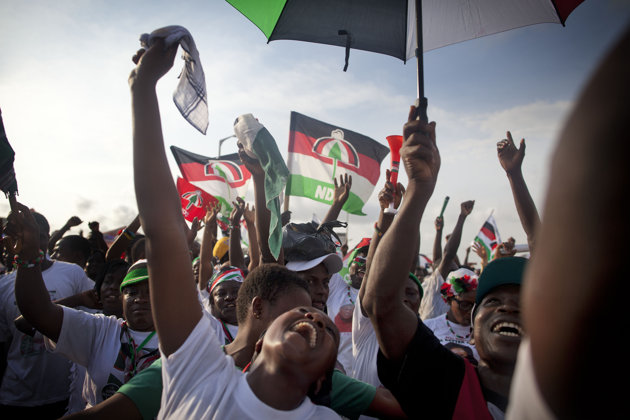In an election troubled by technical hitches, electoral workers in Ghana tallied votes with authorities hoping that it will strengthen the reputation of the country as a model African democracy.
Ghanaians had queued up for the second day running in some parts of the West African nation after hundreds of electronic fingerprint, which is being used for the first time in elections in the country to identify voters, malfunctioned.
This prompted the electoral body to extend the polling into Saturday, a decision which was welcomed by both voters and political parties. This eased worries that there might be eruptions of street violence, a quite common feature in elections in West Africa.
“I was delighted that they extended the elections,” said a 29-year old metal worker outside the capital city of Accra. “I have lost a lot of sleep because of this election, because it means a lot to me.”
Ghana is an investment haven, largely due to their enjoying three decades of peace combined with a recent oil-driven boom, a sharp contrast from the economic woes of Europe and the United States.
President John Dramani Mahama, who stepped into office following the passing away of the late John Atta-Mills in July, is challenged by major opposition candidate Nana Akufo-Addo of the New Patriotic Party (NPP), who has pledged to provide free education and eradicate corruption.
Early results from polling stations are suggesting a tight race, raising the prospect that there will be a repeat of the 2008 elections where the winner, Atta-Mills, edged out Akufo-Addo with less than a one per cent margin.
Hundreds of electronic fingerprint readers had malfunctioned on Friday, and many voters burst into tears when they were told to come back the next day after queuing up for hours.
An electoral body official said 1.6 per cent of the country’s 26,000 polling stations had to open on Saturday in order to clear the backlog and that there shall be an official investigation launched to find out why the machines broke down.
“We are trying to find out what went wrong,” said Sylvia Annor, spokesperson for the electoral commission.
It is expected that results will be out within two days with the possibility of a second round in December if no candidate wins an outright majority. Elections are also being held for parliamentary seats, where Mahama’s National Democratic Party has enjoyed a slim majority.
“I would like to ask the Ghanaian people to remain very calm…We are on course, and there should be no apprehension,” Mahama’s campaign director Elvis Afriyie-Ankrah told a news conference.
“Our people should be law-abiding, they should follow the rules of the game…The electoral commission will speak, and when it speaks, we will listen,” he said.
A spokesman for Akufo-Addo said late on Friday that the election could still be free and fair if voters delayed by technical glitches are given the opportunity to vote.
The voting process has received excellent pass marks from election observers.
“Yes, there have been problems, but generally, it has been a satisfactory process,” said Miranda Greenstreet, the co-chair of Ghana’s Coalition of Domestic Election Observers, which deployed 4,000 election observers.
Since its last coup in 1981, Ghana has had five peaceful and constitutional transfers of powers, in stark contrast to the turmoil that surrounds its region.
Its neighbour, Ivory Coast, descended into a civil war last year after a disputed 2010 poll, while regional neighbours, Mali and Guinea-Bissau have both experienced coup plots this year.
“These elections are important not just to Ghana but for the growing number of states and actors seeking to benefit from increasing confidence in Africa,” said Alex Vines, Africa Research Director at Chatham House.
Akufo-Addo, who is a trained lawyer and whose father was once a Ghanaian president, has criticized the ruling party for not creating jobs and reducing poverty fast enough, saying he will make use of the oil money to provide free primary and secondary education.
On the other hand, Mahama says his aim is to boost the per capita income of Ghanaians to $2300 by 2017 from about half that amount in 2009.
In a country where campaign messages rarely influence voting choices, many believe most of the 14 million voters will cast their ballots based on ethnic, social or regional ties. Mahama comes from Ghana’s north while Akufo-Addo is from the east.



Leave a Reply